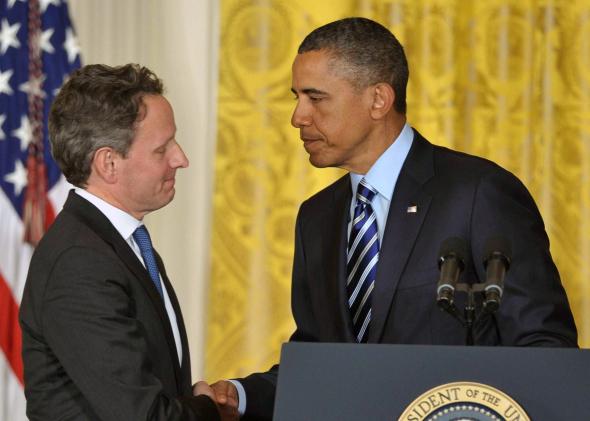Tim Geithner, Good Soldier

Photo by Mandel Ngan/AFP/Getty Images
Tim Geithner's Stress Test has yet to generate any truly compelling anecdotes. There's none of the trash-talking of former (short-term) allies that made it into Robert Gates's Duty, and there's certainly none of the we-were-wrongism that made David Stockman's memoir a sensation. Still Ron Fournier devoted his Monday column to an early, juicy-ish Geihtner excerpt. In the excerpt, in Fournier's telling, Geithner was trying to be at least a little serious about America's long-term debt obligations, and WH flack Dan Pfeiffer "wanted me [Geithner] to say Social Security didn't contribute to the deficit." Fourner:
Liberals played their part and objected to the reforms. Republicans played their part and said they would never raise taxes. Despite advice from Geithner, fellow Democrats, and top Republicans who recognized the GOP negotiating ploy, Obama seized on it as an excuse to surrender to his base. Geithner ultimately exonerates his ex-boss, blaming House Republicans for refusing to accept tax increases and crediting Obama with being "willing to allienate some of his Democratic allies." ... I do know a number of top Republicans who said they were open to cutting a tax-and-cut deal with Obama, and who said they privately told the White House, "We just can't say that now."
Matt Gertz, reading this, accused Fournier of basing his thesis on some excerpts, not the whole text. Fournier does credit Geithner with largely blaming Republicans for the impasse, but that's an understatement. The Geithner version of the debt limit saga is incredibly harsh on the GOP. "For all their soliloquies about the tragic debt we were leaving our grandkids," writes Geithner, "Republicans didn't consider it tragic enough to justify the elimination of a single tax break."
In Geithner's telling, the responsible members of the GOP were rolled as easily as a yo-yo down a steep hill. He remembers a meeting with then-GOP Whip Sen. Jon Kyl, in which the Arizonan called himself a "whatever-it-takes kind of guy on defense." Geithner snapped at him: "You can't be a responsible national security hawk if you're never willing to raise taxes."
Later, when asked by Eric Cantor what the White House would "give" to make a debt deal, Geithner gives himself the line that Democrats would repeat through 2013: "We're not going to give you anything. It's your responsibility to raise the debt limit. It's not a gift to us." Every appearance of John Boehner becomes, in Geithner's narrative, a strange tale about a reasonable guy apologizing for his base. "I don't know if I can bring them along," he sighs after the mid-June talks that almost generated a deal.
Geithner's so hard on the Republicans that he even revisits the debate about the origins of sequestration. "Republicans would later try to blame the President for the 'Obamaquester,' which was kind of amazing," he writes. "They were the ones who threatened to force a default if we didn't agree to spending cuts equivalent to any debt-ceiling increase." The point of all this: Geithner does not leave readers with the impression that the White House deserved any blame. Social Security, as he tells it, was never seriously on the block, and he only disagreed with flacks about how to say that.
